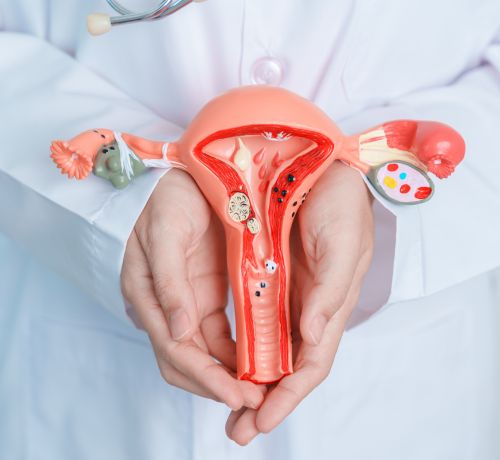Uterine Fibroid Treatment in Thane
Understanding Uterine Fibroids: What Are They?
Uterine fibroids are a common concern for many women. These are noncancerous growths that develop within the uterus, often during a woman’s childbearing years, commonly between age 30 and 50 years. Their growths can vary in size, ranging from small, pea-sized nodules to larger masses that may cause significant discomfort and disruption.
Who Can Develop Uterine Fibroids?
Factors such as hormonal imbalances, genetics, and lifestyle choices can contribute to their development.
What are the different types of uterine fibroids?
- Intramural Fibroids: Most common type of fibroids developing in the muscular layer of the uterus.
- Subserosal Fibroids: These fibroids grow on the outer surface of the uterus and may protrude into the pelvic cavity.
- Submucosal Fibroids: These fibroids form underneath the inner lining of the uterus and can protrude into the uterine cavity, leading to heavy menstrual bleeding and other symptoms.
What are the treatment options for uterine fibroid treatment in Thane?
While uterine fibroids may not always require treatment, they can cause symptoms that interfere with daily life and reproductive health. At Dr. Aditi Godbole’s clinic, Uterine fibroid treatment in Thane includes:
- Medications: Hormonal medications or nonsteroidal anti-inflammatory drugs (NSAIDs) to alleviate symptoms such as heavy bleeding and pelvic pain.
- Minimally Invasive Procedures: Procedures such as uterine artery embolization (UAE) or magnetic resonance-guided focused ultrasound surgery (MRgFUS) to shrink or remove fibroids while preserving the uterus.
- Surgical Removal: The main surgical options include:
- Myomectomy – Fibroids are removed while leaving the uterus in place. This preserves fertility. Done via abdominal incision or laparoscopically.
- Hysterectomy – Surgical removal of the entire uterus. Variations exist like partial hysterectomy keeping the cervix. Performed abdominally, vaginally, or laparoscopically.
- Endometrial Ablation – Destruction of uterine lining to control heavy bleeding. Uterus remains. No help with large fibroids.
- Uterine Artery Embolization – Blocking blood flow to fibroids so they shrink. Nonsurgical procedure. Safe alternative but may impact pregnancy later.
Why Removal May Be Necessary?
In cases where uterine fibroids cause severe symptoms or complications such as infertility, surgical removal may be necessary to improve quality of life and restore reproductive health.
Why is hysterectomy the only solution in some cases of uterine fibroids?
- Size and Number of Fibroids: Large, numerous, or deeply embedded fibroids can cause severe symptoms that other treatments can’t alleviate.
- Failure of Conservative Treatments: If medication or minimally invasive procedures don’t work or symptoms return, hysterectomy may offer a permanent solution.
- Chronic Pain or Discomfort: Fibroids can lead to ongoing pain or discomfort that affects daily life, making hysterectomy necessary for long-term relief.
- Risk of Complications: Complications like anemia or infections may arise, and if conservative measures don’t manage them effectively, hysterectomy may be the best option.
- Desire for Permanent Solution: Some women may choose a hysterectomy if they’ve completed childbearing or want a permanent resolution to fibroid symptoms.
What are the diagnostic tests for detecting uterine fibroids?
- Ultrasound: Imaging tests such as pelvic ultrasound to visualize the size, location, and number of fibroids within the uterus.
- MRI (Magnetic Resonance Imaging): MRI scans may be recommended for a more detailed evaluation of fibroids, particularly for planning surgical procedures.
With her extensive experience and expertise in gynecological care, Dr. Aditi Godbole is dedicated to providing compassionate and personalized treatment for uterine fibroids. As a leading gynecologist, she offers a range of treatment options tailored to each patient’s unique needs, ensuring the best possible outcomes and quality of life.
For more information & consultation on Uterine Fibroid Treatment in Thane, visit Dr. Aditi Godbole, M.B.B.S, DNB (Obs & Gyn ), Best Gynecologist in Thane, or contact us on +91 77158 88289, or schedule an appointment online.

